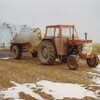Brown Gold?
Agronomists, Fertiliser Advice and Emerging Environmental Awareness in Belgium, 1970-1991
DOI:
https://doi.org/10.51769/bmgn-lchr.11695Abstract
This article analyses the discourse and opinion of agronomists on the manure problem in Belgium during the years 1970-1991. Based on a careful reading of the Belgian Landbouwtijdschrift (Agricultural Magazine), supplemented with secondary sources, four conclusions can be drawn. Firstly, already in the 1970s these agricultural experts warned for an injudicious use of pig manure, which caused nuisance to the environment and local residents. Without referring to the concept of ‘sustainability’, the agronomists did in fact incorporate economic and ecological aspects into their analysis. Secondly, Belgian agricultural experts, inspired by studies and colleagues in other countries, opted for technical solutions. Only seldom did they plea for strong state intervention. Thirdly, the Belgian government intervened only in the course of the 1980s, when the consequences of over-fertilisation threatened to have concrete and recognisable consequences for citizens, and with regard to the quality of drinking water in particular. These legislative initiatives occurred in parallel with a growing environmental awareness within society at large, a deeper understanding of the long-term environmental effects and the introduction of more stringent European environmental legislation. Fourthly, the Manure Decree of 1991 did not bring about a radical revolution in Belgian agriculture. Its primary focus was the supervision and management of the existing manure circuit, rather than on a structural reduction of the surpluses.
Dit artikel analyseert het discours van landbouwkundigen over de mestproblematiek in België in de jaren 1970-1991. Op basis van een zorgvuldige lezing van het Landbouwtijdschrift, aangevuld met secundaire bronnen, kunnen vier conclusies worden getrokken. Ten eerste waarschuwden de landbouwdeskundigen reeds in de jaren 1970 voor een onoordeelkundig gebruik van varkensmest, met overlast voor milieu en omwonenden tot gevolg. Zonder te verwijzen naar het begrip ‘duurzaamheid’, namen de agronomen wel degelijk economische en ecologische aspecten mee in hun analyse. Ten tweede kozen Belgische landbouwexperts, geïnspireerd door studies en collega’s in andere landen, vooral voor technische oplossingen. Slechts zelden pleitten zij voor overheidsingrijpen. Ten derde reageerde de Belgische overheid pas in de loop van de jaren 1980, toen de gevolgen van de overbemesting concrete gevolgen dreigden te hebben voor de burger, namelijk een daling van de drinkwaterkwaliteit. De eerste wetgevende initiatieven liepen parallel met een groeiend maatschappelijk milieubewustzijn, een beter begrip van de milieueffecten op lange termijn en de invoering van een strengere Europese milieuwetgeving. Tenslotte zorgde het Mestdecreet in 1991 niet voor een radicale omwenteling in de Belgische landbouw. De primaire focus lag immers op het toezicht en beheer van het bestaande mestcircuit, en niet op een structurele vermindering van de overschotten.
Downloads

Published
Issue
Section
License
Copyright (c) 2022 Yves Segers

This work is licensed under a Creative Commons Attribution 4.0 International License.
Authors who publish with this journal agree to the following terms:
a) Authors retain copyright and grant the journal right of first publication with the work simultaneously licensed under a Creative Commons Attribution 4.0 International (CC BY 4.0) that allows others to share the work with an acknowledgement of the work's authorship and initial publication in this journal.
b) Authors are able to enter into separate, additional contractual arrangements for the non-exclusive distribution of the journal's published version of the work (e.g., post it to an institutional repository or publish it in a book), with an acknowledgement of its initial publication in this journal.
c) Authors are permitted to post their work online (e.g., in institutional repositories or on their website) prior to and during the submission process.
Authors are explicitly encouraged to deposit their published article in their institutional repository.








